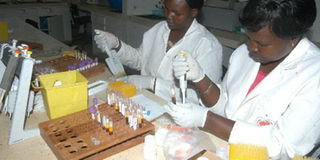Man contracts HIV through blood transfusion

Laboratory technologists Rose Sang [right] and Magdalene Morogo screen donated blood at the Nakuru Blood Transfusion Center in a file photo. The Japanese government and Red Cross said Tuesday that a man in his 60s has contracted HIV through a blood transfusion, while testing continued on another patient who received blood from the same donor. PHOTO/FILE
What you need to know:
- It was the first such case detected in Japan since 2003, according to the government and local media.
- The affected patients in February received blood from a man who apparently had just contracted the virus, health officials and media said.
- Existing tests cannot pick up HIV infections in the very early stages.
TOKYO,
The Japanese government and Red Cross said Tuesday that a man in his 60s has contracted HIV through a blood transfusion, while testing continued on another patient who received blood from the same donor.
It was the first such case detected in Japan since 2003, according to the government and local media.
The affected patients in February received blood from a man who apparently had just contracted the virus, health officials and media said.
Existing tests cannot pick up HIV infections in the very early stages.
The donor, who is in his 40s, gave blood again this month and tested positive for the HIV virus that can cause AIDS.
The discovery prompted officials to analyse stored samples of blood he had donated earlier, which was found to contain the HIV virus.
Health Minister Norihisa Tamura said officials are reviewing safety procedures, including making Red Cross tests more sophisticated.
"All sorts of tests are done, but apparently (the donation was made) during a period when the disease did not show up," Tamura told reporters.
"We ask donors to fill in questionnaires and ask certain individuals to refrain from donating blood. We ask donors to respect that," he said.
Japan, in common with many other nations, discourages blood donations from those at statistically higher risk of contracting HIV.





